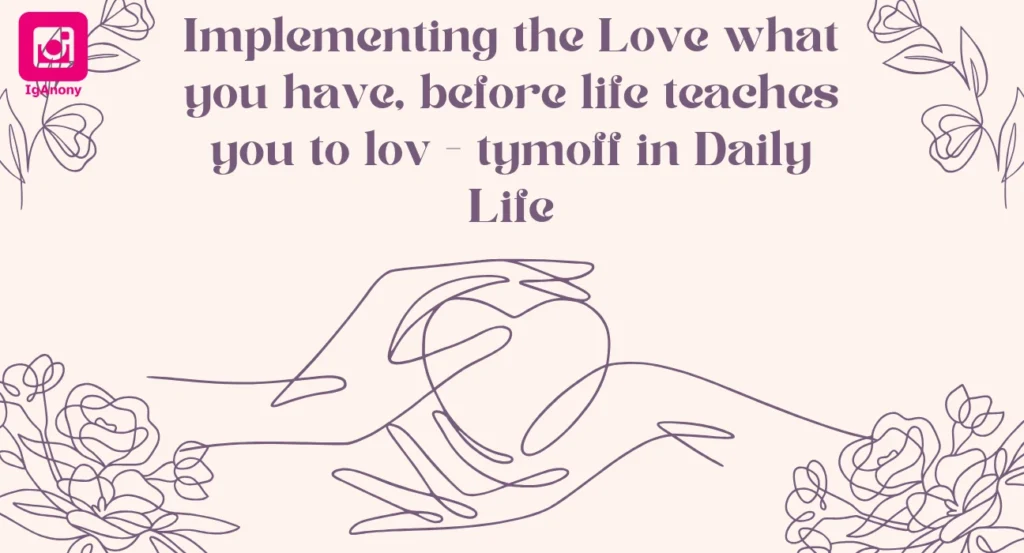Love What You Have, Before Life Teaches You To Lov – Tymoff
Love what you have, before life teaches you to lov – tymoff is a simple yet powerful message that resonates with people across the world. At its heart, this phrase emphasizes the importance of gratitude and being present. It reminds us that life’s most valuable lessons often arrive when it’s too late—when we lose what we didn’t appreciate enough. This article dives into the philosophy behind this phrase, exploring personal stories, reviews, and actionable advice on how to embody this wisdom in daily life.
Philosophy Behind the Phrase
The phrase Love what you have, before life teaches you to lov – tymoff touches on contentment, gratitude, and mindfulness. Tymoff’s message suggests that people often overlook what they currently possess while focusing too much on future aspirations. Whether it’s a cherished relationship, an everyday comfort, or a personal achievement, the tendency to take things for granted is common. When life teaches hard lessons—such as through loss or regret—it becomes painfully clear how much we should have valued what we had.
This philosophy reflects the saying, “You don’t know what you’ve got until it’s gone.” However, Tymoff urges us to adopt gratitude proactively, ensuring we appreciate what we have now, rather than waiting for life’s challenges to teach us this truth the hard way.
Also Read: Instagram Password Requirements
How Life Teaches Through Loss: A Personal Story
Stories of personal loss often illustrate the wisdom behind Love what you have, before life teaches you to lov – tymoff. A popular narrative is that of Sara, a woman who realized the importance of gratitude too late. For years, Sara chased success, feeling that happiness would arrive once she achieved her goals. She neglected the people in her life, including her family, assuming they would always be there.
However, when her father passed away unexpectedly, Sara was overwhelmed with regret. She admitted, “I was too focused on chasing my dreams. I forgot to cherish the moments I had with him.” The loss made her understand the importance of loving what you have in the moment—a lesson she wished she had learned sooner.
Reviews and Public Reception of Tymoff’s Message
Tymoff’s phrase has gained traction across social media and self-improvement platforms, receiving praise for its simplicity and profound impact. Many users resonate with the message, sharing personal interpretations and stories. Reviews on websites and social forums reflect how Tymoff’s words encourage people to reflect on their lives.
- Social Media Impact: On Instagram and Twitter, users often repost quotes from Tymoff, sharing how the message prompted them to take time for gratitude and reflection.
- Community Feedback: Comments in discussion forums like Reddit often reveal how individuals experience a shift in perspective. “After hearing this, I realized I was always chasing the next thing. Now I take a moment every day to appreciate what I have,” wrote one user.
Key Characters of the Message: Gratitude, Contentment, and Mindfulness
At its core, Love what you have, before life teaches you to lov – tymoff revolves around three primary values:
- Gratitude: Practicing gratitude involves focusing on the positive aspects of life, no matter how small they may seem.
- Contentment: Contentment helps us find joy and fulfillment in the present moment, without feeling the need for constant improvement or change.
- Mindfulness: Mindfulness teaches us to stay present, fully experiencing life as it happens, rather than being preoccupied with the past or future.
These three elements form the foundation for a more peaceful, fulfilled life, preventing the regret that can arise from failing to appreciate what we already have.
Implementing the Love what you have, before life teaches you to lov – tymoff in Daily Life

Incorporating Tymoff’s message into daily life doesn’t require major changes. Small shifts in behavior and perspective can make a significant difference. Here are some practical ways to adopt the philosophy:
| Practice | How It Helps |
| Daily Gratitude Journals | Writing down three things you appreciate each day reinforces a positive mindset. |
| Mindful Moments | Taking time to savor meals, walks, or conversations brings awareness to the present. |
| Reframing Complaints | Instead of complaining about a situation, look for something good in it. |
| Expressing Appreciation | Verbally expressing thanks to loved ones strengthens relationships. |
These practices encourage a proactive approach to gratitude, helping people avoid the trap of only appreciating things in hindsight.
Role of Relationships in Tymoff’s Message
Tymoff’s message places particular emphasis on the importance of relationships. Many people only realize the value of their relationships after experiencing loss or distance. Relationships—whether familial, romantic, or friendships—are essential parts of life, yet they are often taken for granted.
A notable character in this narrative is John, a professional who spent years climbing the corporate ladder, neglecting time with his family. After experiencing burnout and the dissolution of several close relationships, John finally understood the significance of balance. “I thought success would make me happy,” he admitted, “but I lost so much along the way. I wish I had valued the people around me earlier.”
Stories like John’s are a stark reminder of Tymoff’s core message: relationships matter more than material achievements.
Also Read: Fastrac OnTrac
Connection Between Happiness and Simplicity
Tymoff’s phrase also draws attention to the fact that happiness often lies in simplicity. In today’s fast-paced world, people tend to associate happiness with grand achievements, wealth, or possessions. However, many realize through experience that joy can be found in small, everyday moments.
Simple pleasures like watching the sunrise, enjoying a meal with family, or spending time outdoors often bring the most fulfillment. Tymoff’s philosophy encourages us to slow down and enjoy these moments, teaching us that contentment doesn’t require elaborate successes.
Frequently Asked Questions
What does Love what you have, before life teaches you to lov – tymoff mean?
This phrase encourages gratitude for what we currently possess—whether relationships, experiences, or material things—before life’s hardships or losses teach us their true value.
How can Tymoff’s philosophy improve mental well-being?
By fostering gratitude and mindfulness, Tymoff’s message helps reduce stress and promote happiness. It shifts focus from chasing future goals to appreciating the present moment, bringing inner peace.
Why do people resonate with this message on social platforms?
The simplicity and emotional depth of the phrase connect with people, prompting reflection on personal experiences of loss or regret. Many share their stories and find comfort in adopting a more appreciative mindset.
How can I practice this philosophy in my daily life?
Start by keeping a gratitude journal, expressing appreciation to loved ones, and being mindful of small joys. This helps nurture contentment and ensures you value what you have before it’s too late.
Conclusion
“Love what you have, before life teaches you to lov – tymoff” is not just a motivational phrase; it’s a life-changing philosophy. Its simplicity hides a deep truth: gratitude and mindfulness are essential for a fulfilled life. The message urges us to appreciate the people, moments, and possessions we have now, rather than waiting for loss or hardship to teach us their value.
Through personal stories, reviews, and practical advice, it becomes clear how valuable this mindset can be. Whether it’s fostering closer relationships, finding joy in simple moments, or shifting our perspective towards contentment, Tymoff’s message has the power to transform lives. The key is to start today—embrace what you have now, because life is unpredictable, and the things we take for granted may not always be within reach.
By practicing this philosophy, we can avoid regret and live with a sense of peace, knowing that we loved fully, appreciated deeply, and cherished the present moment. Let Tymoff’s words be a daily reminder: love what you have, before life teaches you to lov.







